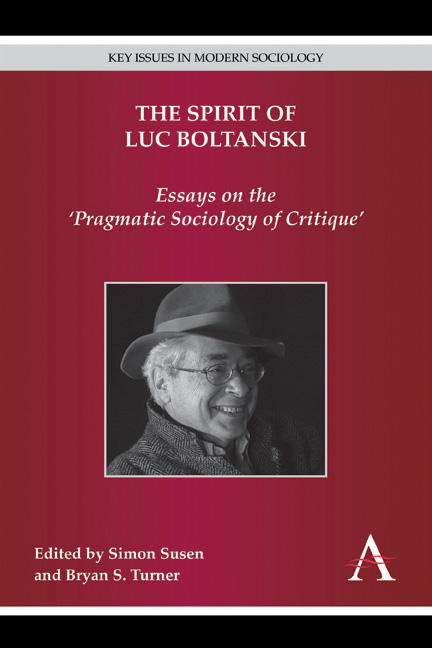Book contents
- Frontmatter
- CONTENTS
- List of Contributors
- Preface
- Part I Introductory Remarks
- Part II Luc Boltanski and (Post-) Classical Sociology
- Part III Luc Boltanski and Pragmatism
- Part IV Luc Boltanski and Critique
- Part V Luc Boltanski and Critical Sociology
- Part VI Luc Boltanski and Political Sociology
- Part VII Luc Boltanski and Contemporary Issues
- Part VIII Luc Boltanski in Conversation
- 22 An Introduction to ‘“Whatever Works”: Political Philosophy and Sociology – Luc Boltanski in Conversation with Craig Browne’
- 23 ‘Whatever Works’: Political Philosophy and Sociology – Luc Boltanski in Conversation with Craig Browne
- 24 Sociology of Critique or Critical Theory? Luc Boltanski and Axel Honneth in Conversation with Robin Celikates
- 25 The Fragility of Reality: Luc Boltanski in Conversation with Juliette Rennes and Simon Susen
- Part IX Luc Boltanski and His Critics
- Index of Names
- Index of Subjects
22 - An Introduction to ‘“Whatever Works”: Political Philosophy and Sociology – Luc Boltanski in Conversation with Craig Browne’
from Part VIII - Luc Boltanski in Conversation
Published online by Cambridge University Press: 05 December 2014
- Frontmatter
- CONTENTS
- List of Contributors
- Preface
- Part I Introductory Remarks
- Part II Luc Boltanski and (Post-) Classical Sociology
- Part III Luc Boltanski and Pragmatism
- Part IV Luc Boltanski and Critique
- Part V Luc Boltanski and Critical Sociology
- Part VI Luc Boltanski and Political Sociology
- Part VII Luc Boltanski and Contemporary Issues
- Part VIII Luc Boltanski in Conversation
- 22 An Introduction to ‘“Whatever Works”: Political Philosophy and Sociology – Luc Boltanski in Conversation with Craig Browne’
- 23 ‘Whatever Works’: Political Philosophy and Sociology – Luc Boltanski in Conversation with Craig Browne
- 24 Sociology of Critique or Critical Theory? Luc Boltanski and Axel Honneth in Conversation with Robin Celikates
- 25 The Fragility of Reality: Luc Boltanski in Conversation with Juliette Rennes and Simon Susen
- Part IX Luc Boltanski and His Critics
- Index of Names
- Index of Subjects
Summary
The discipline of sociology partly originated from a perception of the limitations of political philosophy. The transition to modernity demanded new ways of addressing the questions that political philosophy had typically posed, such as the nature of authority, the conditions of the good life, the definition of justice, the degrees of freedom, and the prerequisites of inclusion in a community. Classical sociological theory reflected the modern appreciation of the independence of ‘the social’ relative to ‘the political’ and the need to understand the internal dynamics of ‘the social’ in their own terms. In a stronger sense, sociological theory suggested that ‘the political’ is shaped by ‘the social’ and this implication could be drawn from otherwise quite conflicting conceptions, from those of the material base and the political superstructure, the overarching social solidarity of the conscience collective, to the cultural background of variations in legitimate domination. This juxtaposition of ‘the social’ and ‘the political’ may not do justice to the complexities of conceptual adaptation; yet, the balance did seem to tip towards sociological theory in modernity, with the transformation of political philosophies into political ideologies and the disciplinary specialization of political science leading to the marginalization of political theory.
Sociology may seek to analyse and explain the malaise of contemporary societies, but – inadvertently – it has often given expression to this malaise. The most common version of unease is the perennial questioning of sociology's orientation as a discipline. This sense of dissatisfaction may explain the contemporary reconsiderations of the relationship between social theory and political philosophy. In Modernity as Experience and Interpretation (2008), Peter Wagner argues that, over the last forty years, the social-historical preconditions in organized modernity of the distinction between political philosophy and social theory have been eroded. Organized modernity depended on some notion of the predictability of the social world, because it involved significant developments in social administration, state planning, mass consumption, and capitalist management.
- Type
- Chapter
- Information
- The Spirit of Luc BoltanskiEssays on the 'Pragmatic Sociology of Critique', pp. 541 - 548Publisher: Anthem PressPrint publication year: 2014



